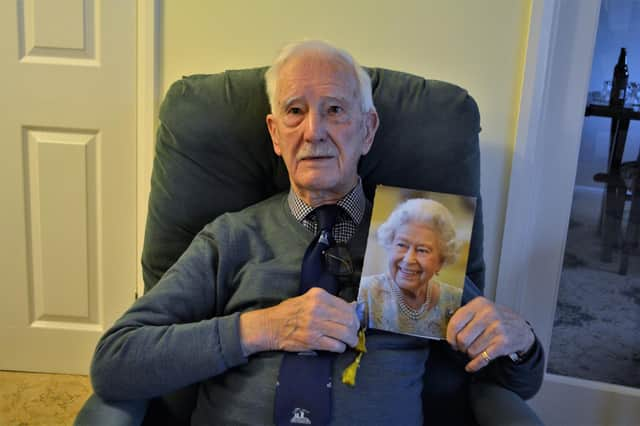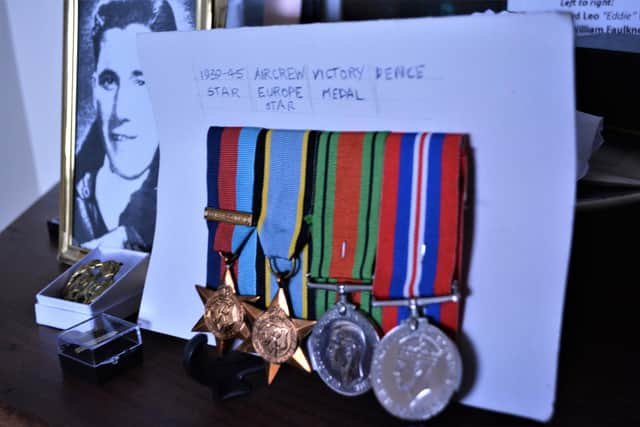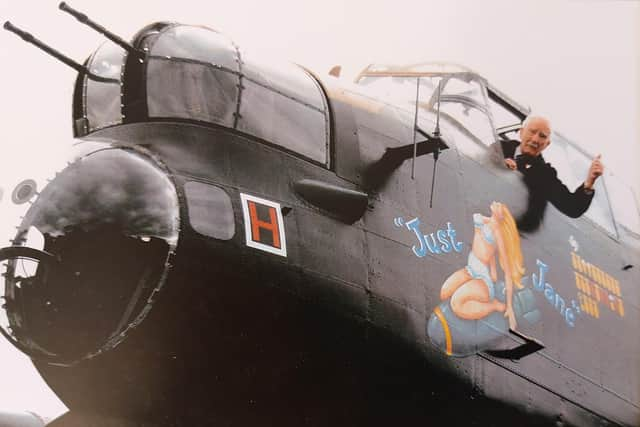Worksop RAF veteran shares his incredible story after his plane caught fire on a mission to Germany during World War Two - part two


Part two of Edward, Edddie, Humes’ story picks up from when his plane caught fire and he was forced to abandon the aircraft while on a mission to Aachen, in Germany in April 1944.
Eddie was being treated for a broken leg in a hospital run by the German Navy when it was bombed six weeks into his stay.


Advertisement
Hide AdAdvertisement
Hide AdEddie said: "I was put on a stretcher in a lorry and headed off, I didn’t know where I was going at that time, but on the journey I fell off the stretcher and broke my leg again.
"We got to a hospital in the centre of Brussels, there were already about 20 airmen there who had been injured.
"I had another operation and put back in traction, and in September 1944 the allies were approaching Brussels, the head of the hospital said that if we signed a paper to say that they were treating us well, they would leave us there for the allies to capture.
“The staff left, but in the morning before the allies got into Brussels, the SS Gestapo came in and just tore up the paperwork.


Advertisement
Hide AdAdvertisement
Hide Ad"As far as they were concerned we were still prisoners and when it came to my turn, they told me to get up and walk.
"I was still in traction there was no way I could get up and walk.
"So they just undid the traction, pulled out the pin and gave me crutches and said walk.
"It wasn’t a very pleasant experience. We were taken in a coach, we joined the exodus from Brussels, hundreds of people leaving in all forms of transport”.
Advertisement
Hide AdAdvertisement
Hide AdUpon reaching the outskirts of Brussels, they were attacked by German RAF fighters, shooting at the people who were fleeing.
The guards that were patrolling the bus would not let let the prisoners off to safety, so an American RAF officer charged at the guards.
As a result they all got off the bus and took shelter in a pigsty at the side of the road. Three of the prisoners escaped and the rest were moved on to hide in a convent in Holland, where they were later found and taken to a camp in Dusseldorf.
Eddie said: “We were there for about four weeks, and from there we were moved to a place called Mannagill, to an interrogation centre.
Advertisement
Hide AdAdvertisement
Hide Ad"It was which is where we should have gone immediately when we were shot down, but if you needed hospital treatment, obviously you couldn’t go straight there.
"You were put into a room by yourself, and you were interrogated eventually, and if you didn’t give them the information they wanted, there was a pistol shot outside.
"When the interrogation was over, the officers said ‘we know all about you’ and they showed me cap which belonged to someone from the squadron that I had been friendly with, who was now a prisoner, called Billy Sweet.
"They then transferred me to a place which had been an opera house before moving on to the prisoner of war camp.”
Advertisement
Hide AdAdvertisement
Hide AdEddie was then transferred to Kraysburg camp in Poland, but that December the Russians began to approach Germany and the rules of war stated that the prisoners should be moved.
Weather conditions were harsh, the snow was several feet thick and on January 6, Eddie’s group had to pack up and leave.
“We had to start walking, take as much as we could carry, but of course took more than we could could carry,” he said.
"We had to start walking into Germany. We crossed the River Oder which was frozen so we just walked straight over it, and from then on we just walked, and sometimes we got a lift on a train.
Advertisement
Hide AdAdvertisement
Hide Ad“We went to the famous camp, Stalag Luft III, and had a few days there.
"People who were still suffering from their injuries were moved to another camp to be examined to decide whether or not they could go home.
"I was considered too fit to go home. From then on we marched at night, and slept through the day, after a couple of weeks we got to a camp.
“We were advised to be in little groups of about four or six and to make sure that there was one disabled person in each group.
Advertisement
Hide AdAdvertisement
Hide Ad"I joined this group. I became the quartermaster and looked after the men.
"I found food and shared it out. Now and again we would get food from the Germans, the Red Cross food supply ceased completely.”
The group continued to march across country, and use any mode of transportation they could.
On one occasion they boarded a goods wagon, crammed in with no no toilet facilities, packed in unbearable and cramped conditions, travelling for miles, before continuing the journey on foot to a prison camp in Munich, where they were turned away because the camp was at full capacity.
Advertisement
Hide AdAdvertisement
Hide AdThey eventually ended up being held in an old school in Kirchberg Austria.
“Life wasn’t too great but then one morning, I woke up and opened the door, there were lots of Germans going to church,” said Eddie.
"I’m a catholic, they were Catholics, and I asked them if it a feast day?
"He said ‘no, the war is over’ and that’s how we found out that the war was over.
Advertisement
Hide AdAdvertisement
Hide Ad"We stayed where we were because we were now in the American zone.
"An American lorry came by and we made ourselves known.
"They stopped and gave us food, they told us to wait, they would be back in a couple of days. They came back and took us Reims, where we boarded a Lancaster and flew home, where we were deloused, debriefed and sent on our way.”
After leaving the RAF, Eddie began a long career in teaching, and during that time he taught at St Mary's Primary School, in Park Street from 1948 to 1960.